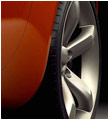General Motors Establishes $3 Million Satellite Research Lab at Carnegie Mellon University
For Release: November 12, 1999
CONTACT:
Mary Woodbeck, GM
PHONE: (810) 986-0160
Debra Jacob, Carnegie Mellon
PHONE: (412) 268-8495
WARREN, Mich. - General Motors and Carnegie Mellon University have agreed to conduct joint research into vehicle information technology by creating a $3 million satellite lab at Carnegie Mellon in Pittsburgh.
"GM's intent is to be the industry leader in product innovation, including vehicle information technology," said Dr. Lawrence D. Burns, vice president of GM Research & Development and Planning. "Supplementing on-going work within General Motors in critical research areas by forming alliances with top academic institutions speeds technology development. Such partnerships allow the exchange of technical knowledge and accelerate the pace of innovation."
"This is an exciting new partnership that brings together two world-class organizations," said Carnegie Mellon President Dr. Jared L. Cohon. "Our university, and particularly our College of Engineering, has always been focused on bringing the power of research and discovery to bear on addressing business issues and pursuing business opportunities. This collaboration promises to foster innovative thinking that will ultimately benefit consumers of General Motors products."
The technologies that will be made possible through this joint effort support GM initiatives to allow passengers and drivers of GM vehicles to easily access a wide array of information and entertainment services in their vehicles. The projects that will be pursued within this lab will focus on developing an integrated, in-vehicle electronic architecture and computing infrastructure.
The satellite lab will be co-directed by Drs. Roger Fruechte of GM Research & Development and Planning and T.E. Schlesinger of Carnegie Mellon. Although the satellite laboratory will be housed in Carnegie Mellon's Department of Electrical and Computer Engineering, research projects will be performed by scientists at both GM R&D facilities in Warren, Mich., and from various departments on campus.
"As we enter the 21st Century, collaborative relationships will serve as catalysts to merge the transportation and communications world and reframe transportation as we know it," Burns said. "Technology networks, such as this type of partnership, will function as incubators for new ideas. We fully intend to win in this race for the future -- the fastest way to deliver innovation to market is to work together."
For more information about Carnegie Mellon:
http://www.cmu.edu




